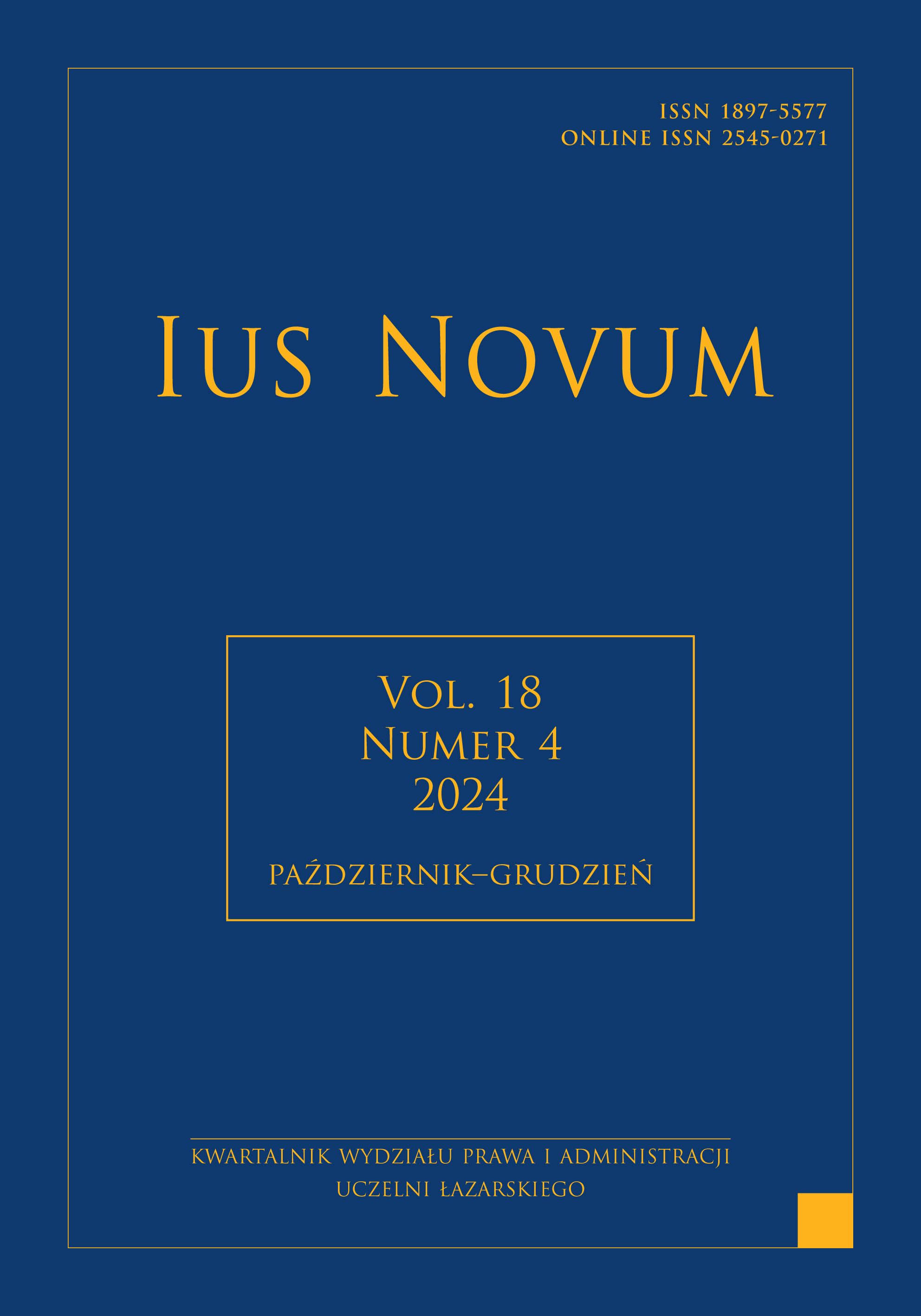Abstract
The article is of a scientific and research nature, and it analyses the right, granted by the Act of 26 July 2024 amending certain acts in order to improve the activities of the Armed Forces of the Republic of Poland, the Police and the Border Guard in the event of a threat to state security , to a request for the appointment of public counsel for the defence made by a soldier, or an officer of the Police or the Border Guard accused of a crime committed as a result of the use of direct coercive measures, the use of weapons or other armaments, or the application or making use of direct coercive measures or firearms in connection with the performance of certain official activities or tasks (Article 78a of the Code of Criminal Procedure), as well as broader possibilities of providing financial support to soldiers in covering the costs of legal assistance incurred by them in cases concerning a crime committed in connection with the performance of official tasks and activities (Article 296 par. 5 and Article 316 par. 5 of the Act on the defence of the Homeland). In addition, the provisions authorising the reimbursement of legal assistance costs to officers of certain other services are analysed. The main scientific objective is to assess the justification for the introduction of these amendments to the criminal procedure law, as well as other existing solutions that privilege soldiers and officers of certain services in terms of access to counsel for the defence. The main research theses aim to demonstrate that these changes lead to a violation of the principle of equality before the law. The results of the study are original in nature, as they indicate the need for the legislator’s intervention. The study is of great importance for science, as it contains a dogmatic analysis and a large load of theoretical thought, and for practice, as it indicates directions for the interpretation of the premises for the application of the new provisions, and thus may contribute to their uniform application.
References
Dąb A., Cincio K., Prawo do obrony, w: Zagadnienia prawne Konstytucji PRL, t. III, Warszawa 1954.
Cieślak M., Polska procedura karna. Podstawowe założenia teoretyczne, Warszawa 1971.
Jastrzębski W., Wnorowski K., Status żołnierzy terytorialnej służby wojskowej w świetle polskiego prawa karnego materialnego i procesowego, „Wojskowy Przegląd Prawniczy” 2023, nr 1.
Kalinowski S., Postępowanie karne. Zarys części ogólnej, Warszawa 1963.
Kardas A., Kardas P., Zasada równości w prawie karnym (zarys problematyki), CzPKiNP 2019, nr 1.
Koncewicz T.T., Podolska A., Dostęp do adwokata w postępowaniu karnym. O standardach i kontekście europejskim, „Palestra” 2017, nr 9.
Krempeć E., w: Obrona Ojczyzny, red. H. Królikowski, Warszawa 2023.
Kruszyński P., Stanowisko prawne obrońcy w procesie karanym, Białystok 1991,
Kruszyński P., w: B. Bieńkowska, E. Kruszyński, C. Kulesza, P. Piszczek, Wykład prawa karnego procesowego, red. P. Kruszyński, Białystok 2003.
Mik B., O potrzebie dodatkowego, szczególnego unormowania odpowiedzialności odszkodowawczej Skarbu Państwa za niesłuszne skazanie oraz niewątpliwie niesłuszne oskarżenie, przedstawienie zarzutów lub zastosowanie nieizolacyjnego środka zapobiegawczego, „Prokuratura i Prawo” 2012, nr 12.
Musolf G., w: Ustawa o Krajowej Administracji Skarbowej. Komentarz, red. A. Melezini, K. Teszner, Warszawa 2024.
Murzynowski A., Istota i zasady procesu karnego, Warszawa 1976.
Murzynowski A., Glosa do wyroku SN z dnia 8 kwietnia 2002 r. ,V KKN 281/00, OSP 2002, nr 12.
Stefański R.A., Obrona obligatoryjna w polskim procesie karnym, Warszawa 2012.
Stefański R.A., Odpowiedzialność za niesłuszne skazanie, niewątpliwie niesłuszne oskarżenie, przedstawienie zarzutów lub zastosowanie nieizolacyjnego środka zapobiegawczego, „Prokuratura i Prawo” 2012, nr 12.
Tuleja P., w: Konstytucja Rzeczypospolitej Polskiej. Komentarz, red. P. Tuleja, Warszawa 2023.
Wiliński P., Zasada prawa do obrony w polskim procesie karnym, Kraków 2006.
Zieliński M., Wykładnia prawa. Zasady, reguły, wskazówki, Warszawa 2010.

This work is licensed under a Creative Commons Attribution-NonCommercial-ShareAlike 4.0 International License.
Copyright (c) 2024 Uczelnia Łazarskiego w Warszawie, Polska

